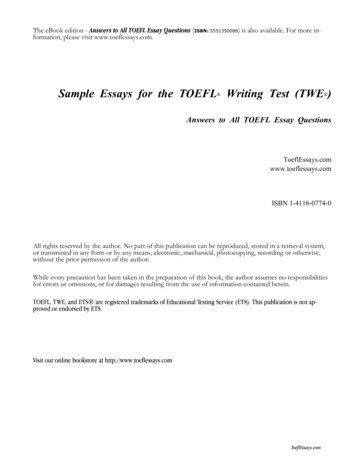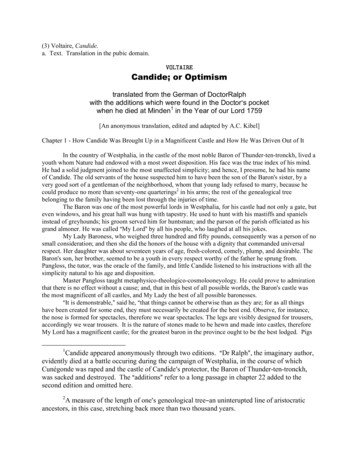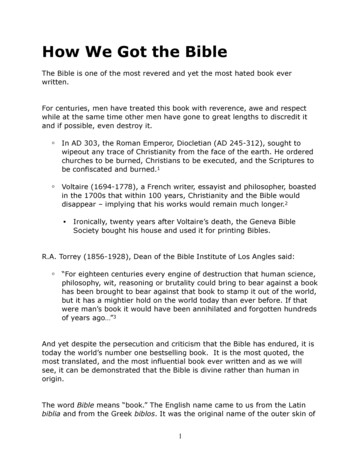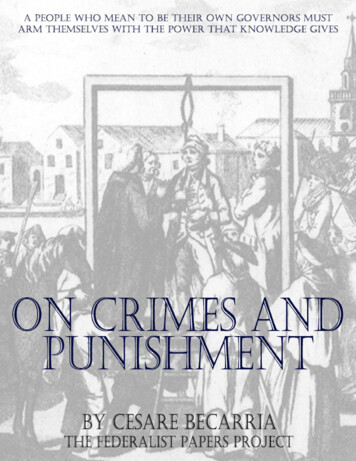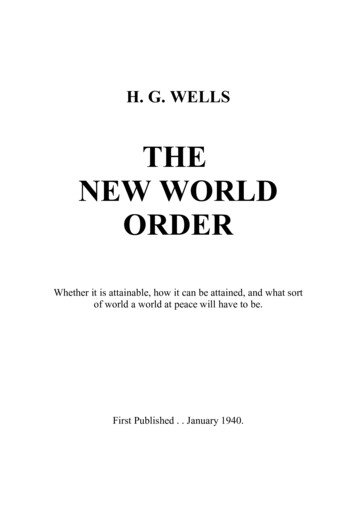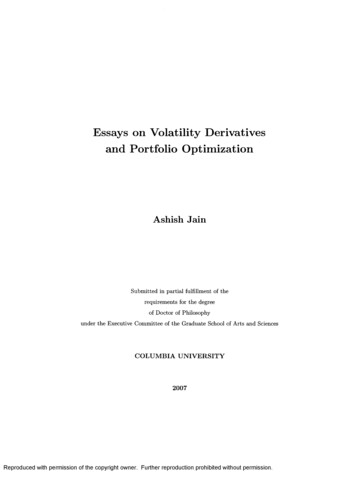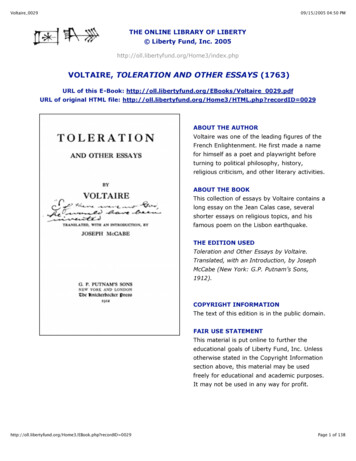
Transcription
Voltaire 002909/15/2005 04:50 PMTHE ONLINE LIBRARY OF LIBERTY Liberty Fund, Inc. AIRE, TOLERATION AND OTHER ESSAYS (1763)URL of this E-Book: http://oll.libertyfund.org/EBooks/Voltaire 0029.pdfURL of original HTML file: http://oll.libertyfund.org/Home3/HTML.php?recordID 0029ABOUT THE AUTHORVoltaire was one of the leading figures of theFrench Enlightenment. He first made a namefor himself as a poet and playwright beforeturning to political philosophy, history,religious criticism, and other literary activities.ABOUT THE BOOKThis collection of essays by Voltaire contains along essay on the Jean Calas case, severalshorter essays on religious topics, and hisfamous poem on the Lisbon earthquake.THE EDITION USEDToleration and Other Essays by Voltaire.Translated, with an Introduction, by JosephMcCabe (New York: G.P. Putnam’s Sons,1912).COPYRIGHT INFORMATIONThe text of this edition is in the public domain.FAIR USE STATEMENTThis material is put online to further theeducational goals of Liberty Fund, Inc. Unlessotherwise stated in the Copyright Informationsection above, this material may be usedfreely for educational and academic purposes.It may not be used in any way for recordID 0029Page 1 of 138
Voltaire 002909/15/2005 04:50 PMTABLE OF CONTENTSINTRODUCTIONENDNOTESON TOLERATION IN CONNECTION WITH THE DEATH OF JEAN CALASSHORT ACCOUNT OF THE DEATH OF JEAN CALASCONSEQUENCES OF THE EXECUTION OF JEAN CALASTHE IDEA OF THE REFORMATIONWHETHER TOLERATION IS DANGEROUS, AND AMONG WHAT PEOPLES IT IS FOUNDHOW TOLERATION MAY BE ADMITTEDWHETHER INTOLERANCE IS OF NATURAL AND HUMAN LAWWHETHER INTOLERANCE WAS KNOWN TO THE GREEKSWHETHER THE ROMANS WERE TOLERANTTHE MARTYRSOF THE DANGER OF FALSE LEGENDS, AND OF PERSECUTIONABUSES OF INTOLERANCEWHETHER INTOLERANCE WAS OF DIVINE RIGHT IN JUDAISM, AND WHETHER ITWAS ALWAYS PRACTISED.EXTREME TOLERANCE OF THE JEWSWHETHER INTOLERANCE WAS TAUGHT BY CHRISTTHE ONLY CASES IN WHICH INTOLERANCE IS HUMANLY LAWFULACCOUNT OF A CONTROVERSIAL DISPUTE IN CHINAWHETHER IT IS USEFUL TO MAINTAIN THE PEOPLE IN SUPERSTITIONVIRTUE BETTER THAN SCIENCEOF UNIVERSAL TOLERATIONENDNOTESON SUPERSTITIONENDNOTESON THE INTERPRETATION OF THE OLD TESTAMENTENDNOTESON THE INTERPRETATION OF THE NEW TESTAMENTEPISTLE TO THE ROMANS (TRANSLATED FROM THE ITALIAN OF COUNT DE CORBERA)ARTICLE I.ARTICLE II.ARTICLE III.ARTICLE IV.ARTICLE V.ARTICLE VI.ARTICLE VII.ARTICLE VIII.FIRST p?recordID 0029Page 2 of 138
Voltaire 002909/15/2005 04:50 PMSECOND CHIEF IMPOSTURETHIRD CHIEF IMPOSTURE (WHICH CONTAINS SEVERAL)FOURTH IMPOSTUREFIFTH IMPOSTURESIXTH CHIEF IMPOSTURESEVENTH CHIEF IMPOSTURE ON THE SUPPOSED PONTIFICATE OF SIMONBARJONA, CALLED PETEREIGHTH IMPOSTURENINTH IMPOSTUREARTICLE IX.ENDNOTESTHE SERMON OF THE FIFTYPRAYERSERMONFIRST POINTSECOND POINTTHIRD POINTENDNOTESTHE QUESTIONS OF ZAPATA (TRANSLATED BY DR. TAMPONET, OF THE SORBONNE)ENDNOTESWE MUST TAKE SIDES; OR, THE PRINCIPLE OF ACTIONINTRODUCTIONIOF THE PRINCIPLE OF ACTIONIIOF THE NECESSARY AND ETERNAL PRINCIPLE OF ACTIONIIIWHAT IS THIS PRINCIPLE?IVWHERE IS THE FIRST PRINCIPLE? IS IT INFINITE?VTHAT ALL THE WORKS OF THE ETERNAL BEING ARE ETERNALVITHAT THE ETERNAL BEING, AND FIRST PRINCIPLE, HAS ARRANGED ALLTHINGS VOLUNTARILYVIITHAT ALL BEINGS, WITHOUT EXCEPTION, ARE SUBJECT TO ETERNAL LAWSVIIITHAT MAN IS ESSENTIALLY SUBJECT IN EVERYTHING TO THE ETERNAL LAWSOF THE FIRST PRINCIPLEIXXOF THE PRINCIPLE OF ACTION IN SENTIENT BEINGSOF THE PRINCIPLE OF ACTION CALLED THE SOULXIXIIEXAMINATION OF THE PRINCIPLE OF ACTION CALLED THE SOULWHETHER THE PRINCIPLE OF ACTION IN ANIMALS IS FREEXIIIOF THE LIBERTY OF MAN, AND OF DESTINYXIVABSURDITY OF WHAT IS CALLED LIBERTY OF INDIFFERENCEXVXVIXVIIXVIIIOF EVIL AND, IN THE FIRST PLACE, THE DESTRUCTION OF BEASTSOF EVIL IN THE ANIMAL CALLED MANROMANCES INVENTED TO EXPLAIN THE ORIGIN OF EVILOF THE SAME ROMANCES, IMITATED BY BARBARIC recordID 0029Page 3 of 138
Voltaire 002909/15/2005 04:50 PMXIXXXXXIXXIIDISCOURSE OF AN ATHEIST ON ALL THISDISCOURSE OF A MANICHÆANDISCOURSE OF A PAGANDISCOURSE OF A JEWXXIIIDISCOURSE OF A TURKXXIVDISCOURSE OF A THEISTXXVDISCOURSE OF A CITIZENENDNOTESPOEM ON THE LISBON DISASTER; OR AN EXAMINATION OF THE AXIOM, “ALL IS WELL”ENDNOTESVOLTAIRE, TOLERATION AND OTHER ESSAYS (1763)INTRODUCTIONIT seems useful, in presenting to English readers this selection of the works of Voltaire, to recallthe position and personality of the writer and the circumstances in which the works werewritten. It is too lightly assumed, even by many who enjoy the freedom which he, more thanany, won for Europe, and who may surpass him in scepticism, that Voltaire is a figure to be leftin a discreetly remote niche of memory. “Other times, other manners” is one of the phrases hecontributed to modern literature. Let us genially acknowledge that he played a great part indispelling the last mists of the Middle Ages, and politely attribute to the papal perversity andthe lingering vulgarity of his age the more effective features of his work. Thus has Voltairebecome a mere name to modern rationalists; a name of fading brilliance, a monumental name,but nothing more.This sentiment is at once the effect and the cause of a very general ignorance concerningVoltaire; and it is a reproach to us. We have time, amid increasing knowledge, to recover themost obscure personalities of the Middle Ages and of antiquity; we trace the most elementarycontributors to modern culture; and we neglect one of the mightiest forces that made thedevelopment of modern culture possible. I do not speak of Voltaire the historian, who, adistinguished writer says, introduced history for the first time into the realm of letters; Voltairethe dramatist, whose name is inscribed for ever in the temple of the tragic muse; Voltaire thephysicist, who drove the old Cartesianism out of France, and imposed on it the fertile principlesof Newton; Voltaire the social reformer, who talked to eighteenth-century kings of the rights ofman, and scourged every judicial criminal of his aristocratic age; Voltaire the cosmopolitan, rdID 0029Page 4 of 138
Voltaire 002909/15/2005 04:50 PMman, and scourged every judicial criminal of his aristocratic age; Voltaire the cosmopolitan, whoboldly set up England’s ensign of liberty in feudal France. All these things were done by the“flippant Voltaire” of the flippant modern preacher. But he can be considered here only as oneof the few who, in an age of profound inequality, used the privilege of his enlightenment toenlighten his fellows; one of those who won for us that liberty to think rationally, and to speakfreely, on religious matters which we too airily attribute to our new goddess, Evolution.The position of Voltaire in the development of religious thought in Europe is unique. Even if hiswords had no application in our age, it merits the most grateful consideration. Trace to itssources the spirit that has led modern France and modern Portugal to raise civic ideals abovecreeds, and that will, within a few decades, find the same expression in Spain, Italy, Belgium,and half of America. You find yourself in the first half of the nineteenth century, when, in allthose countries, a few hundred men, and some women, maintained a superb struggle withrestored monarchs and restored Jesuits for the liberty that had been wrested from them; andyou find that the vast majority of them were disciples of Voltaire. Go back to the very beginningof the anti-clerical movement; seek the generators of that intellectual and emotional electricitywhich, gathering insensibly in the atmosphere of Europe in the second half of the eighteenthcentury, burst at last in the lurid flashes and the rolling thunders of the Great Revolution. Onthe religious side, with which alone I am concerned here, that devastating storm wasoverwhelmingly due to the writings of Voltaire. Rousseau, it is true, gave to the world hissimple Deistic creed, and with sweet reasonableness lodged it in the minds of many; Diderotand d’Holbach and La Mettrie impressed their deeper scepticism with a weight of learning. ButVoltaire was the oracle of Europe. “I have no sceptre, but I have a pen,” he once said toFrederick the Great. And when, in his later years, he poured out from his remote château onthe Swiss frontier the flood of satires, stories, sermons, dialogues, pamphlets, and treatiseswhich ate deep into the fabric of old Europe, his pen proved mightier than all the sceptres of itskings. To ignore Voltaire is to ignore history.My object, however, in introducing to English readers these few characteristic specimens of hisanti-clerical work is not solely to bespeak some gratefulness for the toleration and freedomwhich he enforced on a reluctant world, or to gratify a simple curiosity as to the character ofhis power. These are not dead words, not ashes of an extinct fire, which we disinter; for theworld is not dead at which they were flung. If they cause resentment in the minds of some, thepublication will be the more justified. But before I explain this paradox, let me show how theworks came to be written, and written in such a way.The life of Voltaire, which some conceive as a prolonged adolescence, has a very clear andinstructive division into adolescence, manhood, and ripe age. All the works given in this volumebelong to the last part, but we must glance at the others. François Marie Arouet was born, inthe very comfortable bourgeois family of a staid Parisian notary, in 1694. He became aprecocious, sharp-eared boy. His godfather was an abbé, a kind of ecclesiastic—not usually apriest—in the France of the time who drew his income from the Church, and therefore felt moreentitled than the ordinary layman to scoff at its dogmas and ignore its morals. He could pleadthe example of his bishops. Several of these abbés visited the home of the Arouets, and ordID 0029Page 5 of 138
Voltaire 002909/15/2005 04:50 PMlittle “Zozo” his first lessons in Biblical criticism. In the great college of the Jesuits he learned toarticulate his scepticism. In his seventeenth year he set out on the career of letters. The kindlyabbé, who, having answered to God for him at the baptismal font, felt bound to guide hisfortunes, introduced him to one of the most brilliant and dissolute circles in Paris. It was a kindof club of abbés, nobles, writers, etc., and in it he would rapidly attain that large and peculiarknowledge of the Old Testament which appears in his writings. He sparkled so much at thesuppers of the Epicureans, and earned such reputation, that he was put in the Bastille forcertain naughty epigrams, which he had not written; and he was exiled for another epigram, ona distinguished sinner, which he had written. In the pensive solitude of the Bastille he changedhis name to Voltaire.1 He emerged bolder than ever, wrote tragedies and poems and epigrams,was welcomed in the smartest salons of Paris, and behaved as a young gentleman of the timewas expected to behave, until his thirty-first year.In 1726 he was, through the despotic and most unjust action of a powerful noble, again put inthe Bastille, and was then allowed to exchange that fortress for the fogs of London. Up to thistime he had no idea of attacking Church or State. He had, in 1722, written a letter on religion—in the vein, apparently, of some of Swinburne’s unpublished juvenilia—which a distinguishedwriter of the time, to whom he read it, described as “making his hair stand on end”; it was,however, not intended for circulation. But experience of England, for which he contracted apassionate admiration, and which (as Mr. Churton Collins has shown) he studied profoundly,sobered him with a high and serious purpose. He met all the brilliant writers of that age inEngland, and took a great interest in the religious controversy which raged over AnthonyCollins’s Discourse. He returned to France in 1729, vowing to win for it the liberty andenlightenment he had enjoyed in England. The splendid English Letters which he wrote with thataim, and was afraid to publish, leaked out in 1734. The book was burned by the hangman, andhe had to retire once more, for letting France know how enlightened England was in the daysof George I.I pass over twenty years of his strenuous and brilliant career. He wrote his most famoustragedies and histories; he made an ardent study of, and introduced to France, the new scienceof Isaac Newton, whose funeral he had witnessed in London; he was banished from his countryfor smiling at Adam and Eve; he deserted France for Germany, and then quarrelled withFrederick the Great; he tried liberal Switzerland, and found that it gave you liberty only toattack other people’s dogmas; and in 1760 he settled at Ferney, since the shrine of ContinentalRationalism, on the frontier, so that he could talk to Calvinists from the French side, and crossthe border, if need were, to talk to France. But France was at his feet. For eighteen years morehe showered his rain of publications on it. Even in those illiterate days some of his publicationssold 300,000 copies. And when at last, in 1778, he was tempted to revisit Paris, the roar ofdelight, of esteem, of abject worship, overwhelmed him, and he died in a flood of glory.To those last twenty years of his life belong the anti-Christian works reproduced in this volume.He was now a man of mature judgment, vast erudition, and grave humanitarian purpose. Thecommon notion in England of Voltaire’s works, as superficial gibes thrown out by the way in abrilliant career, is sheer nonsense. His command of history was remarkable; and he had, rdID 0029Page 6 of 138
Voltaire 002909/15/2005 04:50 PMbrilliant career, is sheer nonsense. His command of history was remarkable; and he had, forthe time, a thorough grasp of science and philosophy. His arguments for the existence of Godwill compare with those of the ablest lay or clerical theologians of his time. His knowledge wasdefective and inaccurate because all knowledge was defective and inaccurate in the eighteenthcentury, when research was only just beginning to recover from its long ecclesiastical paralysis.No man in France had a larger command of such knowledge as the time afforded, and the usehe made of it was serious and high-purposed. It is only the superficial who cannot see thedepth below that sparkling surface; only the insensible who cannot feel the strong, steady beatof a human heart behind the rippling laughter.Écrasez l’infame—“Crush the infamous thing”—the battle-cry which he sent over Europe fromthe Swiss frontier, was but a fiery expression of his love of men, of liberty, of enlightenment,and of progress. Read the stories of brutality in the guise of religion that are told in thesepages—stories which ran into Voltaire’s day—the stories of “religious” processions and relics andsuperstitions, the story of how this ignorant credulity had been imposed on Europe, and how itwas maintained by sceptical priests, and say, if you dare, that the phrase was not a cry oftruth, sincerity, and humanity. There was even a profoundly religious impulse in his work. Aclerical friend once confided to me that he found a use in Voltaire. It seemed that, wheninspiration for the Sunday sermon failed, he fell upon my “atheistic friends,” Voltaire andRousseau, and the French Revolution they brought about. He was amazed to hear that theybelieved in God as firmly as, and much more reasonably than, he and his colleagues did.Voltaire’s aim was a sincere effort to rid pure religion of its morbid and abominableovergrowths.Very good, you say; but why not have set about it more politely? For two plain reasons. First,because the character of his opponents fully justified him in directing his most scathing witupon them. The Jesuits, whom he chiefly lashed, were in his own time ignominiously expelledby nearly every Catholic Power in Europe, and were suppressed by the Pope. The other clergywere deeply tainted with scepticism in the cities, and befogged with dense ignorance in theprovinces. One incident will suffice to justify his disdain. His latest English biographer, S. G.Tallentyre, who is not biassed in his favour, says that it is most probable, if not certain, thatwhile the Catholic authorities were burning his books in Paris, and shuddering at his infidelity,they were secretly tempting him, with the prospect of a cardinal’s hat, to join the clergy. It iscertain that they invited him to do religious work, and that, at the height of his anti-clericalwork, he received direct from the Pope certain relics to put in a chapel he had built for his poorneighbours. Could a prince of irony restrain himself in such circumstances? The other reason isthe character of the dogmas and practices he assailed. Read them in the following pages.It is true that there are passages in Voltaire which none of us would, if we could, write to-day.The taste of the eighteenth century, still fouled by the Middle Ages, is not the taste of thetwentieth. Besides some longer passages which have been omitted from the Treatise onToleration, as will be explained, a few lines have been struck out or modified here and there inone or two of the works in this selection. Let me not be misunderstood, however. They aremainly words of the Old Testament, and comments inspired only by those words, that ordID 0029Page 7 of 138
Voltaire 002909/15/2005 04:50 PMbeen omitted. In the eighteenth century one could quote and comment in public on thesegrossnesses. Indeed, by some singular mental process, which Voltaire alone could characterise,the books containing these crudely sexual passages are still thrust into the hands of childrenand of confined criminals by the joint authority of Church and State in England; and gravebishops and gentle women say that they are the Word of God.And this brings me to the last point that I desire to touch before I introduce, one by one, theworks contained in this volume. Why reproduce at all, in the twentieth century, these fittingscourges of the superstitions of the eighteenth? I have said that they deserve to be reproducedfor their historical interest and for the great part they have played in the history of Europe; butthere is another reason. I have an idea that, if Voltaire were alive in England to-day, he wouldwrite with more scathing irony than ever. I imagine him gazing with profound admiration at thatmarvellous picture of the past which science and archæology have given us, and then asking atwhat date in the nineteenth century we ceased to dispute about consubstantiality andtransubstantiation, took the gilt off our Old Testament, and elevated our bishops to the rank ofcitizens. I then fancy him peeping into the fine schools of London or Manchester, and learningthat the first educational authorities in England still set children to learn about Adam and Eve,the Deluge, the Plagues of Egypt, and the remarkable proceedings of Joshua and David and therest. I try to conceive him studying the faces of learned judges and professors, as they listengravely to the reading of the Bible and the creeds in church on Sundays, or reverently handlethe book in court. I picture his amazement as he learns that this England, which he thought soenlightened, still, at the dictation of its bishops, retains the most abominable divorce law in thecivilised world; or hears preachers and social students seriously expressing concern for thefuture of Europe on account of the decay of docility to the clergy. What would he have writtenon such a situation?The satire of Voltaire is not out of place in modern England. As long as the Bible is, howeverinsincerely, pressed on us as the Word of God, and retained in our schools, we are compelledto point out in it features which make such claims ludicrous. As long as the clergy maintain thattheir rule in the past was a benefit to civilisation, and therefore its decay may be a menace tocivilisation, we are bound to tell the ugly truth in regard to the past. As long as educated menand women among us profess a belief in the magic of transubstantiation and auricularconfession and miracles, and the uneducated are encouraged to believe these things literally,the irony of Voltaire is legitimate. Christian bodies have, of late years, made repeated attemptsto induce our leaders of culture to profess the Christian faith. The issue has been to make itclear that the great majority of our professors, distinguished writers, and artists hold either thesimple theism of Voltaire or discard even that. The doctrines attacked here by Voltaire arewholly discredited. Yet they are still the official teaching of the Churches (except of theCongregationalists); they are largely enforced on innocent children, and they are literallyaccepted by some millions of our people. I see no reason to refrain from letting the irony ofVoltaire fall on them once more.The reader must not, however, conclude at once that the following pages are so many red-hotcharges into the tottering ranks of mediæval dogmas. My aim has been to illustrate rdID 0029Page 8 of 138
Voltaire 002909/15/2005 04:50 PMcharges into the tottering ranks of mediæval dogmas. My aim has been to illustrate theversatility of Voltaire’s genius, and to exhibit his own sincere creed no less than his mostpenetrating scourges of what most educated men in his time and ours regard as utterlyantiquated delusions. There are pages here that might receive a place of honour in the mostorthodox religious journals of England; other pages in which the irony is so subtle and thetemper so polite that, without the terrible name, they would puzzle many a clergyman. In theQuestions of Zapata, however, and in parts of one or two other essays, I have given specimensof the Voltaire who was likened to Antichrist.The selection opens with the Treatise on Toleration, which has a mainly historical interest, andillustrates the finest side of Voltaire’s work and character. It shows him as a profoundhumanitarian, putting aside, in his seventieth year, his laughter and his comfort to take up thecause of an obscure sufferer, and shaking France, as Zola did in our time, with his denunciationof a judicial crime. The story of the crime is told in the essay itself; but it is not told, or in anyway conveyed, that, but for the action of the aged rationalist, not a single effort would havebeen made to secure redress. His splendid action on that and a few similar occasions has beenheld by critical students of his career to atone for all his errors. Many Protestants who scoff at“Voltaire the scoffer” may learn with surprise that his noble and impassioned struggle earnedfor them the right to live in Southern France. The treatise was published in 1763. I haveomitted a number of lengthy and learned notes and one or two chapters which are incidental tothe argument and of little interest to-day.The three Homilies—those On Superstition, On the Interpretation of the Old Testament, and Onthe Interpretation of the New Testament—are selected from five which Voltaire wrote in 1767,with the literary pretence that they had been delivered before some liberal congregation atLondon in 1765. The second of these Homilies is one of the most effective indictments of theOld Testament, considered as an inspired book. Nowhere in rationalistic literature is there anexposure of the essential humanity of the Old Testament so condensed yet so fluent, so originalin form, comprehensive in range, and unanswerable in argument. It was published, it isbelieved, in 1767, though the first edition is marked 1766. Its humour it malicious from the firstline, as the “Dr. Tamponet” whose name is put to it was really an orthodox champion of theSorbonne. It is in this short diatribe that I have chiefly made the modifications of which I havespoken. It was Voltaire’s aim to show that the coarseness of many passages of the OldTestament is quite as inconsistent with inspiration as its colossal inaccuracy and its childlikesuperstition. An English translation, similarly modified, of the Questions of Zapata was made byan anonymous lady, and published by Hetherington, in 1840. In the present translation some ofthe paragraphs are omitted, and the numbering is therefore altered.The Epistle to the Romans, another specimen of Voltaire’s most deadly polemic, is a just andmasterly indictment of the papal system. It was issued in 1768, and very promptly put on theIndex by the outraged Vatican. But it penetrated educated Italy, and had no small share in theenlightenment which has ended in the emancipation of the country. The exquisite imitations ofsermons which follow contain some of Voltaire’s most insidious and delicate irony. The Sermonof the Fifty was written and published in cordID 0029Page 9 of 138
Voltaire 002909/15/2005 04:50 PMThe volume closes with the famous poem which Voltaire wrote, in the year 1755, when heheard that an earthquake had destroyed between 30,000 and 40,000 people in Portugal. It wasone of the chief festivals of the Catholic year, the Feast of All Saints (November 1), and thecrowded churches were in the very act of worship, when the ground shook. In a few minutes16,000 men, women, and children were slain, and as many more perished in the subsequentfires and horrors. Voltaire was at Geneva, and the horrible news threw him into the deepestdistress. The poem into which he condensed his pain and his doubts is not a leisurely andpolished piece of art. It has technical defects, and is unequal in inspiration. Should we admire itif it were otherwise? But it is a fine monument to his sincerity and just human passion, and itcontains some phrases that became proverbial and some passages of great beauty. I havealtered the structure of the verse—the original is in rhymed hexameters—only in order that Icould more faithfully convey to those who read only English the sentiments and, as far aspossible, the phrasing of Voltaire. One allusion that recurs throughout needs some explanation.Browning’s “All’s right with the world” was a very familiar cry in the eighteenth century. TheEnglish Deists, and J. J. Rousseau in France, held obstinately to this most singular optimism.Although Rousseau made a feeble and friendly reply to the poem, it proved a deadly blow tohis somewhat fantastic teaching on that point.Immediately preceding this poem I have given a translation of Voltaire’s philosophical essay, Ilfaut choisir. This was written by him in 1772, six years before his death, and is the mostsuccinct expression of his mature religious views. It is really directed against his atheisticfriends at Paris, such as d’Holbach. Condorcet said of it that it contained the most powerfulargumentation for the existence of God that had yet been advanced. Its remarkable lucidityand terseness enable us to identify his views at once. He did not believe in the spirituality orimmortality of the soul, but he had an unshakable conviction of the existence of God. It issometimes said that the Lisbon earthquake shook his theism. This is inaccurate, as a carefulcomparison of the two works will show. He never believed that the supreme intelligence wasinfinite in power, and the haunting problem of evil always made him hesitate to ascribe morethan limited moral attributes to his deity. His one unwavering dogma—it does not waver for aninstant in the poem—is that the world was designed by a supreme intelligence and is moved bya supreme power. Had he lived one hundred years later, when evolution began to throw itsmagical illumination upon the order of the universe and the wonderful adaptation of its parts,his position would clearly have been modified. As it was, he, with constant sincerity, avowedthat he could not understand the world without a great architect and a prime mover of allmoving things. In all his works the uglier features of the world, which, unlike many theists, hesteadfastly confronted, forbid him to add any other and warmer attributes to this bleakintelligence and mysterious power.J. M.October, k.php?recordID 0029Page 10 of 138
Voltaire 002909/15/2005 04:50 PM[1 ] Probably adopting a name which is known to have existed among his mother’s ancestors.But it is curious that “Voltaire” is an anagram of his name—Arouet 1 (e) j (eune) — if u beread as v and j as i.ON TOLERATIONIN CONNECTION WITH THE DEATH OF JEAN CALASSHORT ACCOUNT OF THE DEATH OF JEAN CALASTH E murder of Calas, which was perpetrated with the sword of justice at Toulouse on March 9,1762, is one of the most singular events that deserve the attention of our own and of laterages. We quickly forget the long list of the dead who have perished in our battles. It is theinevitable fate of war; those who die by the sword might themselves have inflicted death ontheir enemies, and did not die without the means of defending themselves. When the risk andthe advantage are equal astonishment ceases, and even pity is enfeebled. But when aninnocent father is given into the hands of error, of passion, or of fanaticism; when the accusedhas no defence but his virtue; when those who dispose of his life run no risk but that of makinga mistake; when they can slay with impunity by a legal decree—then the voice of the generalpublic is heard, and each fears for himself. They see that no man’s life is safe before a courtthat has been set up to guard the welfare of citizens, and every voice is raised in a demand ofvengeance.In this strange incident we have to deal with religion, suicide, and parricide. The question was,Whether a father
The life of Voltaire, which some conceive as a prolonged adolescence, has a very clear and instructive division into adolescence, manhood, and ripe age. All the works given in this volume belong to the last part, but we must
